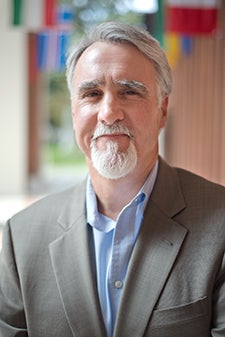
USC Dornsife experts analyze Europe’s refugee crisis: Part 2
More than 710,000 people fleeing war and poverty have entered the European Union in the first nine months of this year — more than double the number in all of 2014, according to EU border agency Frontex. The majority are from the Middle East, in particular from war-torn Syria.
The future for Syria, USC Dornsife experts Laurie Brand, Robert English and Steven Lamy agree, looks bleak. There is no peaceful solution on the horizon, and the mass exodus of the country’s educated middle class risks turning Syria into a failed state, making future reconstruction extremely challenging.
“If what this represents is indeed a major outflow of the Syrian middle class, then that is a terrible harbinger for the continuation of Syria as we knew it,” said Brand, Robert Grandford Wright Professor and professor of international relations and Middle East studies, and director of the Middle East Studies Program at USC Dornsife.
“This is the destruction of an entire country. It’s unparalleled, going beyond what we saw in Iraq, where devastating destruction occurred over decades accompanied by a slow bleed of sanctions. In Syria’s case it has been much more intense and has occurred over a shorter period of time. It’s just horrendous.”

Laurie Brand, Robert Grandford Wright Professor and professor of international relations and Middle East studies, and director of the Middle East Studies Program. Photo by Peter Zhaoyu Zhou.
Iraq and Paris: the wider consequences
President Barack Obama’s announcement in September that the United States will admit 10,000 refugees following a stringent two-year vetting process was met with a distinct lack of enthusiasm. This was true both in the U.S., where many consider the figure too high, and in Europe, where it is widely considered too low. Following the disclosure that some of the suicide bombers involved in the Paris terrorist attacks of Nov. 13 may have passed through Greece posing as refugees, America’s appetite to accept Syrian refugees has plummeted further.
Despite Obama’s warning in the aftermath of the Paris attacks against equating the issue of refugees with terrorism, several presidential candidates have emphasized national security over aiding refugees.
“We can barely come to any kind of comprehensive agreement on our own immigration problems for Mexico and Latin America,” said Robert English, associate professor of international relations, Slavic languages and literatures, and environmental studies. “So how are we going to suddenly take in significant numbers of Middle Eastern refugees when we have our own nationalist, nativist anti-immigrant forces, especially in the Republican party?” added English, who is interim director of the School of International Relations.
“It’s an intractable issue, particularly in an election year.”

Robert English, associate professor of international relations, Slavic languages and literatures, and environmental studies, and interim director of the School of International Relations. Photo by Peter Zhaoyu Zhou.
However, if the U.S. prefers to distance itself from the refugee crisis, describing it as a “European problem,” many Europeans perceive the apparently never-ending tide of refugees on their doorstep as the direct result of U.S.-led intervention in Iraq.
Brand agrees with them.
“The U.S. bears a huge responsibility for anything that happens in Iraq. By extension, part of what was going on in Syria was the result of the instability and regional developments that came in the aftermath of the invasion and our occupation of Iraq. So to pretend that it’s someone else’s problem is to ignore that historical context.”
Anti-immigrant nationalists in Europe point to the fact that while the U.S. stirred up instability in the Middle East by overthrowing Saddam Hussein in Iraq and intervening in Libya, it is Europe that is paying the price.
“We in the U.S. certainly didn’t anticipate this side effect of our intervention in the Middle East,” English said. “From a European viewpoint we look a little bit hypocritical and reckless. After all, we stuck a stick in the hornets’ nest and the Europeans are the ones being stung.”
Potential solutions
So how do we solve the current crisis?
“My sense is that the EU will try to set up Turkey as the holding pen by dangling the carrot of EU membership,” said Steven Lamy, professor of international relations and vice dean for academic programs. “I think the EU will start intervening by picking up the refugees when they arrive in the Mediterranean and immediately redirecting them to Turkey.”
Describing it as “a splendid idea on paper,” English, however, disagreed.

Steven Lamy, professor of international relations and vice dean for academic programs.
“It makes sense, but it won’t happen,” he said. Even the big, multicultural Western European countries fall into line with smaller Eastern European countries on the issue of Turkey joining the EU, he said. “They share the view that Turkey, a big Islamic state, simply does not fit culturally with Europe.”
Lamy suggested that there may be some forcible relocation of refugees to countries that are willing to take them — possibly Norway or Sweden. “Canada, which historically has welcomed immigrants, may be the solution, especially now that it has a newly-elected liberal government,” he said.
“Most politicians would love to see these refugees resettled somewhere in the Middle East because of their language and religion, but that doesn’t seem to be an option,” he said. “There is no place for them there and I don’t see any hope for peace in that region for a long time.”
In the short term, English predicts that the wealthier EU countries will be forced to cough up a lot more money. “The refugees will make it through a very difficult winter in very difficult circumstances, but they will survive. Emergency measures will be taken, but a lasting solution will not come until we have a long term solution in war-torn Syria.”
In Part 1 of this three-part series, USC Dornsife experts examine the underlying reasons behind European countries’ differing reactions to the flood of immigrants arriving at their borders. In Part 3, our scholars speculate on the long-term implications of the Syrian migration and suggest a possible silver lining to the current crisis.